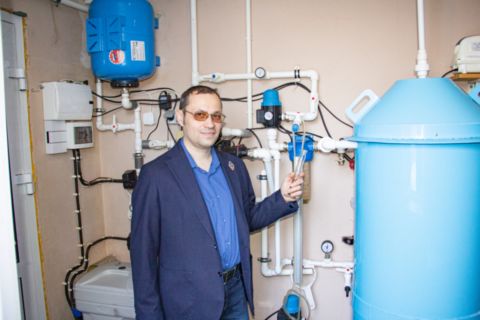Postgraduate student of the Department of Water Supply and Sanitation of the SUSU Institute of Architecture and Construction Maksim Novoselov and his co-author, Candidate of Sciences (Chemistry) Marina Belkanova, have patented a method for purifying groundwater from radon, alpha activity, iron, manganese, hardness salts, and carbon dioxide. There are no similar technical solutions in Russia.
Personal experience prompted Maksim Novoselov to make a scientific discovery.
"The water from the well at my land plot in the centre of the city of Chelyabinsk contains iron, manganese, radon, alpha activity and dissolved carbon dioxide," says the scientist. "The need to deal with this water situation turned my house into a laboratory."
First, scientists patented a useful model − a groundwater aerator, which combines two methods of physical degassing of water: bubbling in a countercurrent flow pattern of water and air, and spraying water in the form of a dome in the air flow. The idea was prompted by the effect of an inverted spoon, which we observe when washing dishes when we place a spoon under running water. The next invention was to equip the groundwater aerator with a submersible pump to eliminate noise in the living room. The researchers tested each stage of their work in real households − in Chelyabinsk, Chebarkul, and Lazurny settlement. Experience in installation and operation of water purification systems allowed them to develop five standard technological schemes. One of them turned out to be unique, and scientists filed a patent for the invention of a method for purifying underground water from radon, alpha activity, iron, manganese, hardness salts, and carbon dioxide.

"The method is based on a combination of two methods: Na-cationization and aeration," explains Maksim Novoselov. "The Na-cationization method has long been known and is widely used for softening, deferrization, demanganization and removal of radionuclide cations. However, water after cationization becomes aggressive and causes corrosion of sanitary equipment. Therefore, deep aeration of softened and/or iron-free water stabilizes it, removes odours and improves the taste of the water."

Today, the installation by the Chelyabinsk scientists provides the most stable water quality as compared to all modern water purification systems for cottages. It can be used not only in private households, but also in suburban (dacha) comradeships, farms, social facilities in rural areas (schools, first-aid posts, shops), and industrial productions with low water consumption. There are no technical difficulties for wide distribution of the invention. The production of aerators has been established in Chelyabinsk, and installation of equipment using the invented method is planned to be carried out under a license from SUSU in the second half of the year.




